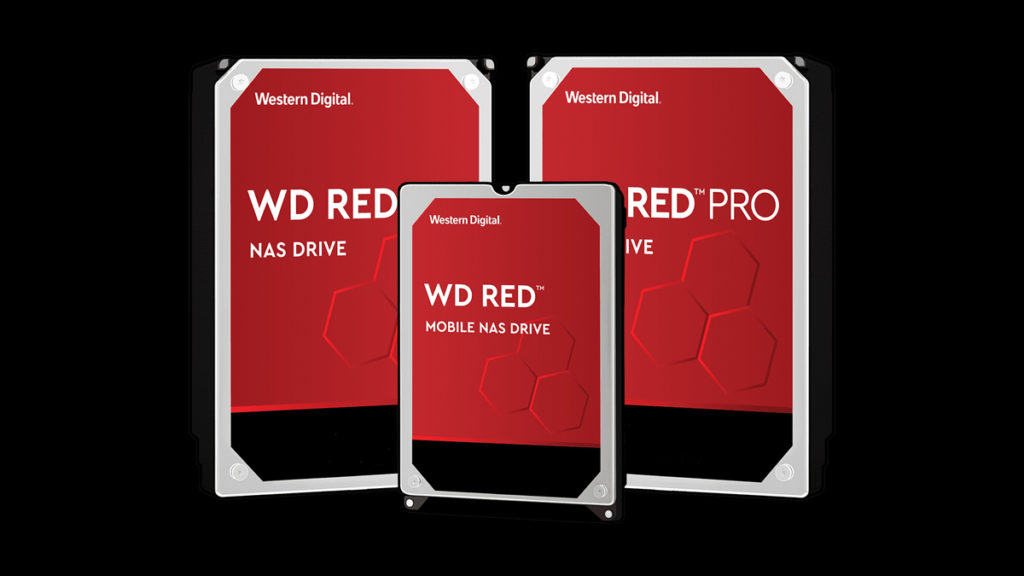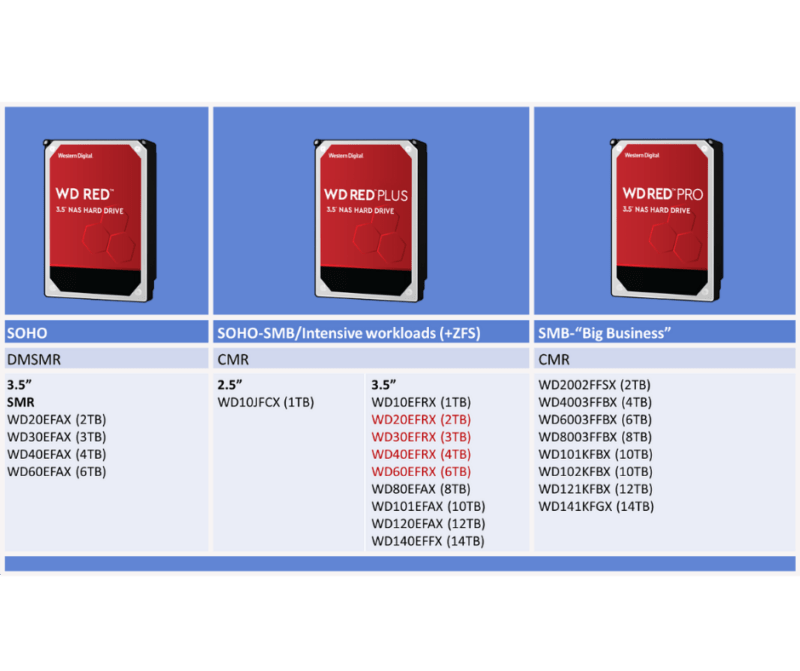
Western Digital is making it easier for users to differentiate between CMR- and SMR-based HDDs in its Red family, the latter of which have been condemned by NAS users for poor write performance and errors in RAID arrays. Joining the existing “Red” and “Red Pro” SKUs this week is a new CMR-based “Plus” tier that, like the “Pro” group, comprises only HDDs of the CMR variety. SMR-based drives have been relegated to the standard, baseline Red category. Here are the complete details from Western Digital:
WD Red for NAS – Now More Choices for Customers
We want to thank our customers and partners for your feedback on our WD Red family of network attached storage (NAS) hard drives. Your real-world insights shared through in-depth reviews, blogs, forums and from our trusted partners are directly contributing to our work on an expansion of models and clarity of choice for customers. Please continue sharing your experiences and expectations of our products, as this input influences our development.
Due to the fact that the range of use cases for NAS has become increasingly diverse, we are now making it easier for users to match the right drive with their applications and workloads – from moderate small office/home office (SOHO) workloads to intensive small- and medium-business (SMB) use, as well as more demanding environments.
The WD Red Family
Here’s a breakdown of our products for NAS use-cases:
- Our current device-managed shingled magnetic recording (DMSMR) (2TB, 3TB, 4TB, and 6TB) WD Red series will be the choice for the majority of NAS owners whose demands are lighter SOHO workloads.
- WD Red Plus is the new name for conventional magnetic recording (CMR)-based NAS drives in the WD Red family, including all capacities from 1TB to 14TB. These will be the choice for those whose applications require more write-intensive SMB workloads such as ZFS. WD Red Plus in 2TB, 3TB, 4TB and 6TB capacities will be available soon.
- Our WD Red Pro (CMR 2TB to 14TB) series for the highest-intensity usage remains the same.

The Right Drive for SOHO Users
From our experience, we see most SOHO users rely on their systems for office file sharing, home backup or content archiving. Throughput and idle time are key considerations in these types of SOHO workloads. As explained in our post on DMSMR, as well as in media reviews, these drives prefer idle time to perform background operations, without which the drive may take longer to complete a command. Our use-case analysis shows that SOHO workloads typically are based on short periods of access to the drives. This results in extremely low average throughput (compared with the drive’s available throughput) and provides plenty of idle time for the DMSMR drive to perform the necessary background operations, making it an ideal fit for this application.
From a sequential performance perspective, our tests confirm that our WD Red DMSMR drives are on par with our existing CMR drives. Third-party testing also validates the performance of WD Red DMSMR drives compared with other drives under general hard drive benchmarks used in an NAS environment.
In a RAID rebuild scenario using a typical Synology or QNAP (non-ZFS) platform, WD Red DMSMR drives perform as well as CMR drives or show slightly longer RAID rebuild times, depending on the condition of the drive and extent of rebuild required. While test results can vary from one methodology and test bed to the next, we acknowledge that in some cases DMSMR, for the idle-time reasons covered earlier, can result in slower rebuild times.
For Users with Workload-intensive Applications and ZFS: CMR
The explosion of data seen today has spawned a spectrum of NAS uses cases, as well as increasingly demanding applications. One of those includes use of ZFS, an enterprise-grade file system. The increased amount of sustained random writes during ZFS resilvering (similar to a rebuild) causes a lack of idle time for DMSMR drives to execute internal data management tasks, resulting in significantly lower performance reported by users. While we work with iXsystems on DMSMR solutions for lower-workload ZFS customers, we currently recommend our CMR-based WD Red drives, including WD Red Pro and the forthcoming WD Red Plus.
We’re listening.
In addition to taking customer and partner feedback seriously, we conduct in-house testing on the WD Red family of drives for compatibility, performance, endurance and other factors. These drives typically have been validated for compatibility on many platforms from NAS manufacturers such as Synology, QNAP, Asustor, Buffalo, Netgear and Thecus. The DMSMR drives met all of our test requirements, and we’re actively working with system makers like Synology to ensure use cases are validated for customers.
As a leader in HDD and flash technologies, we are committed to addressing the evolving needs of our customers and to offering the right technology for each implementation. This philosophy launched WD Red drives years ago, and they have been a leader in their field ever since. We continue engaging customers and partners and analyzing real-world data to offer a family of WD Red NAS drives – from HDDs to SSDs – that serve all workloads and applications.
